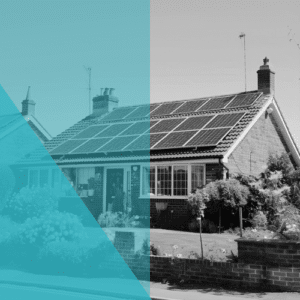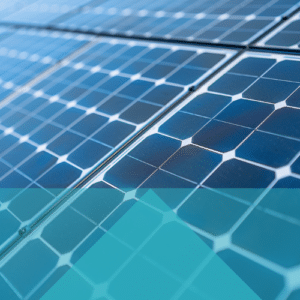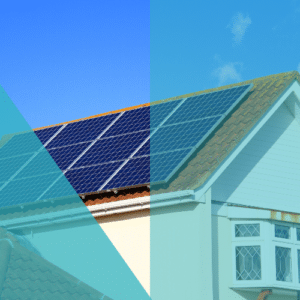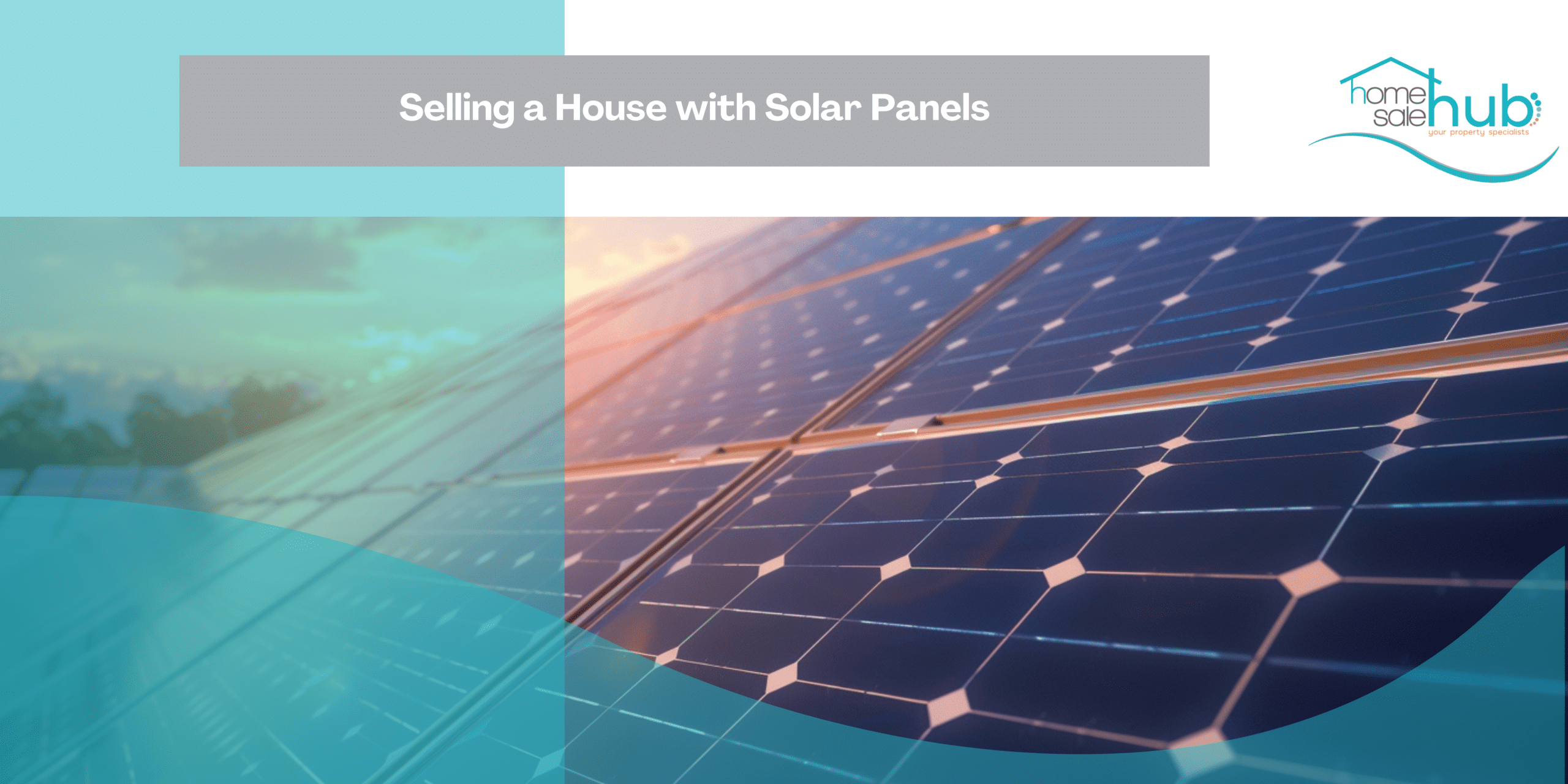Address
38f Goring Rd,
Worthing
BN12 4AD
Understanding Solar Panels on Residential Properties
How Common Are Solar Panels on Residential Properties in the UK?

This growth was largely driven by the government’s feed-in tariff (FiT) scheme, introduced in 2010. The scheme incentivised homeowners to invest in solar technology by offering feed in tariff payments for the electricity their systems generated. Even after the FiT scheme ended in 2019, the popularity of solar panels remained strong, bolstered by the introduction of the Smart Export Guarantee (SEG) in 2020.
The SEG enables homeowners to earn money for the electricity their solar panels generate and export back to the grid. Alongside potential income, solar panels offer free electricity for household use and contribute to reducing energy costs—key reasons for their ongoing appeal.
Benefits of Selling a House with Solar Panels
Increased Property Value and Attracting Eco-Conscious Buyers
Solar panels can make a home more appealing to prospective buyers while also increasing its market value. Research suggests that properties with solar panels can sell for up to 4.1% more than comparable homes without them.
For eco-conscious buyers, solar panels offer significant advantages. A well-sized, energy efficient system can supply 20–30% of a household’s annual energy needs, reducing reliance on grid electricity and leading to noticeable savings on energy bills. In addition, many homeowners can earn extra income by selling excess electricity generated by their solar panels back to the grid under schemes like the Smart Export Guarantee (SEG).
From an environmental perspective, installing solar panels helps reduce a property’s carbon footprint. On average, every kilowatt-peak (kWp) of solar panels installed can cut a home’s annual carbon emissions by around half a tonne. For buyers who value sustainability, this is a strong selling point.
Types of Solar Panel Ownership
Owned Solar Panels

To maximise interest, highlight the benefits of the system, such as:
Free electricity generation that reduces energy bills.
The environmentally friendly advantage of using renewable energy.
Providing supporting documents, such as the electrical installation certificate, warranty information, and maintenance records, can reassure buyers of the system’s safety and efficiency. These details can also demonstrate the system’s value as an integral feature of the home.
Leased Solar Panels
Selling a home with leased solar panels involves a few additional steps since the panels are owned by a third-party solar company, and the homeowner leases them under an agreement. To proceed with the sale, the lease agreement typically needs to be transferred to the new owner, which requires the buyer’s consent.
Buyers may have questions about the lease terms, such as ongoing costs and responsibilities for system maintenance. Addressing these concerns early by providing clear and comprehensive information can help avoid confusion and build trust. Some sellers choose to simplify the process by negotiating with the solar company to buy out the remaining lease period, removing the need to transfer the agreement. However, this option often involves a significant upfront cost.
Leased solar panels can still appeal to buyers, especially when the energy savings outweigh any associated lease costs. To ease the sale, ensure that all necessary paperwork is readily available and that you can provide straightforward answers to common questions.
It’s also important to note that leased solar panels can sometimes complicate mortgage approvals, as some lenders may be reluctant to finance homes under such agreements. This factor could impact the marketability of your property, so preparing for potential delays or concerns in advance is key to a smoother process.
Valuing and Marketing Your Solar-Powered Home
Valuing Your Home with Solar Panels
Solar panels can add significant value to a property, but the exact figure depends on several factors. The age of the system plays a key role; newer panels with a longer operational lifespan are generally more appealing to buyers. Additionally, the system’s condition and efficiency are critical—well-maintained, high-performance panels can make a home more attractive and command a higher price.
Hiring a professional appraiser is often a wise choice. They can assess the specific impact of the solar installation on your property’s value, considering benefits like reduced energy costs and any potential income from schemes such as the Smart Export Guarantee (SEG). This valuation can provide clarity for both the seller and potential buyers.
Marketing Your Solar-Powered Home
When marketing a property with solar panels, it’s important to focus on their unique advantages. Potential buyers are often drawn to the promise of lower energy bills and the opportunity to reduce their carbon footprint. Highlighting these benefits can help attract interest, especially from environmentally conscious buyers.
Detailing the specifications of your solar system, such as its age, capacity, and maintenance history, can provide reassurance to prospective buyers. If available, energy usage data showing the savings achieved by the panels can also be a powerful selling point. Using online platforms is an effective way to showcase these details, reaching a broad audience and appealing to buyers who value sustainability and energy efficiency.
Addressing Buyer Concerns
Common Concerns from Buyers
While solar panels offer numerous benefits, some buyers may have hesitations when considering a home equipped with them. Addressing these concerns upfront can help build confidence and make the sale process smoother. Mortgage lenders may have specific criteria for properties with solar panels, especially if the panels are leased rather than owned outright.
A common worry is the cost of maintenance and potential repairs. Buyers may be unfamiliar with how solar systems work and could overestimate the effort required to keep them operational. Reassure them by explaining that solar panels generally require minimal upkeep, with occasional cleaning being the primary task. Highlighting any professional maintenance you’ve had carried out can also be reassuring.
Providing detailed information about the system’s warranty and performance guarantees is another effective way to address concerns. Buyers will appreciate knowing the solar panels are covered for long-term efficiency and reliability. For example, many manufacturers offer warranties of 20–25 years, with inverters typically covered for 10 years. Sharing this information helps buyers feel confident in the system’s durability and performance.
If the panels are leased, ensure buyers have clarity about the lease terms, including any costs or responsibilities they would assume. Transparency about these details can prevent confusion and foster a positive buying experience.
Solar Panel Installation and Maintenance
Understanding Solar Panel Installation
Solar panels are designed to be highly durable and require minimal upkeep, making them an appealing long-term feature for homeowners. Regular cleaning is typically the main maintenance task, ensuring the panels remain free from debris, dirt, or anything that might reduce their efficiency.
It’s worth checking the warranty details for the solar panel system. Many manufacturers offer performance warranties that cover a 20- to 25-year period, guaranteeing a certain level of efficiency over time. Buyers are often reassured when they know this information is available.
One key component to consider is the inverter, which converts the electricity generated by the panels into a usable form for the home. Inverters generally need replacing every 10 years, so homeowners and potential buyers should factor this cost into their budget. Being upfront about the expected lifespan of components and potential replacement costs demonstrates transparency and builds trust during the selling process.
Maintenance and Repair of Solar Panels

Periodic inspections by a professional can be particularly beneficial. An expert can assess the system’s performance, check for any signs of wear or damage, and ensure all components, including the inverter, are functioning as they should. Addressing potential issues early can save money in the long run and provide peace of mind to buyers.
Keeping thorough records of all maintenance and repairs is highly recommended. These documents can demonstrate the system’s condition to potential buyers and reassure them of its reliability. A well-maintained system is a strong selling point and can enhance the home’s appeal.
Transferring Ownership and Lease Agreements
Transferring Ownership of Solar Panels
When selling a property with owned solar panels, transferring ownership is a straightforward but essential step. The seller must complete and sign a transfer form, which ensures that the buyer assumes the rights to any associated benefits, such as payments from the Smart Export Guarantee (SEG) scheme.
Once the transfer is complete, the buyer will need to take responsibility for providing quarterly electricity readings from the generation meter to the energy provider. This step is crucial for ensuring the new owner receives payments for excess electricity exported to the grid.
Ensuring all documentation related to the solar panel system is available and in order—such as warranties, installation certificates, and maintenance records—can help streamline the transfer process. Buyers are more likely to feel confident about the purchase if they have a clear understanding of their responsibilities and benefits.
Selling a House with Financed or Leased Solar Panels
Selling a House with Financed Solar Panels
If your solar panels were purchased through a finance agreement, it’s crucial to determine whether you fully own the panels or if the finance company has a registered interest in your property. This interest may be recorded with the Land Registry, which could complicate the sale.
To proceed with the sale, you’ll likely need to pay off any remaining balance on the finance agreement. Some companies charge significant early repayment fees or inflated buyout costs, so it’s important to review your contract for these terms. Once the loan is settled, you’ll need to work with the Land Registry to remove the company’s interest from the property records.
Resolving these steps promptly ensures the sale process remains on track, as delays with the Land Registry can hold up transactions. Providing proof of ownership and clearance of any financial encumbrances reassures buyers and simplifies the process.
Selling a House with Leased Solar Panels

Transparency is key when addressing potential buyer concerns. Providing a clear summary of the lease terms—such as its duration, associated costs, and conditions for transfer—helps ensure buyers feel informed and confident about assuming the agreement. Some buyers may worry about how the lease impacts their mortgage eligibility or whether the energy savings justify the costs, so being ready to answer these questions can prevent complications.
As an alternative, some sellers opt to buy out the remaining lease period, eliminating the need for transfer. While this can simplify the sale, it often involves significant upfront costs, so consider this option carefully. Regardless of the approach, ensuring that all necessary documents are prepared and concerns are addressed proactively can make the process far smoother and less stressful for both parties.
Working with Estate Agents and Cash Buyers
Estate Agent
Using an estate agent is a traditional approach to selling a home, offering convenience and expertise. Estate agents handle the marketing, create property listings, and manage viewings, making the process less stressful for sellers. However, when selling a home with solar panels, there are some specific considerations to bear in mind.
Properties with solar panels can sometimes take longer to sell. This is often due to factors like transfer of ownership for the feed-in tariff (FIT) scheme or addressing potential buyer concerns about maintenance or lease agreements. Estate agents familiar with solar-powered properties can help manage these challenges by clearly communicating the benefits of solar energy and assisting in gathering the necessary paperwork.
It’s also important to factor in the costs associated with estate agents. Most charge a commission, typically a percentage of the final sale price, and there may be additional expenses for legal fees and any removal costs if required. Choosing an agent with experience in selling homes with solar installations can make the process smoother.
Cash Buyer
Selling to a cash buyer is a faster alternative, ideal for homeowners looking for a quick and straightforward sale. Cash buyers are often less concerned about specific property features, such as solar panels or other complications, and they can accommodate sales within short timeframes.
While cash buyers offer convenience and certainty, it’s important to research and compare offers to ensure you’re getting a fair deal. Some cash buyers may offer less than market value for the property, so weighing the speed of sale against potential financial trade-offs is crucial.
Cash buyers also eliminate the risk of the sale falling through due to issues with mortgage approvals, making them a reliable choice for sellers who prioritise simplicity.
Preparing for a Smooth Sale
Pre-Sale Checklist
Getting organised before listing your property can help ensure a smoother sale process, especially when solar panels are involved. One of the most important steps is to gather all relevant documentation related to the solar panel system. This includes:
Proof of ownership or lease agreements.
Details of any payments received through the feed-in tariff (FIT) scheme or the Smart Export Guarantee (SEG).
Warranty documents and performance guarantees for the panels and inverter.
Records of maintenance and repair work.
Providing potential buyers with a comprehensive overview of the solar system will help address any concerns and demonstrate its reliability and value.
It can also be beneficial to hire a professional to inspect the solar panels before listing your home. A recent inspection report showing that the system is in good condition and operating efficiently can provide added reassurance to buyers. If any minor issues are identified, addressing them early can prevent delays or complications during the sale process.
Taking these steps not only reduces potential buyer hesitations but also makes your property stand out as well-maintained and ready for a smooth transition.
Conclusion
Final Tips for Selling a House with Solar Panels
Selling a house with solar panels can be a rewarding process when approached with preparation and understanding. Start by familiarising yourself with the terms of the solar panel installation, whether they are owned, leased, or financed, and consider how these terms might influence the property’s appeal or transfer process.
When marketing your home, focus on the benefits solar panels offer, such as reduced energy bills, environmental advantages, and potential income from schemes like the Smart Export Guarantee (SEG). These features can be especially attractive to buyers who prioritise sustainability and cost savings.
Being ready to address buyer concerns is crucial. Providing clear, detailed information about warranties, maintenance records, and system performance guarantees can help alleviate worries and build confidence in the value of your solar-powered home.
Finally, choose the right selling method for your needs. Whether working with a cash buyer for a quick sale or an estate agent with experience in solar properties, ensure they understand the unique aspects of selling a home with solar panels. With careful preparation, you can turn the solar system from a potential obstacle into a key selling point that sets your property apart.


